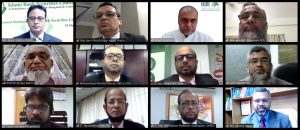-By Raquib Siddiqi
The International Air Transport Association (IATA) has called for airlines, governments, and industry stakeholders to guide the development of the commercial airline industry into its next century with a global mindset and based on a foundation of global standards.
“The key to unlocking aviation’s future potential is a global mindset supported by strong partnerships,” explained IATA director general Tony Tyler while opening the 70th Annual General Meeting of the organisation in Doha.
“Aviation connects people and business to make ‘global’ possible. Securing aviation’s future begins with some immediate challenges. Airlines must be profitable, safe and secure businesses. We need to provide efficient, customer-focused services. And sustainability must be integral to everything that we do,” said Tyler.Tyler’s comments were made in his State of the Industry address to the 70th IATA Annual General Meeting and World Air Transport Summit in Doha, Qatar in June last.
The meeting took place as the industry commemorates the 100th anniversary of scheduled commercial flights.
Scheduled commercial aviation began with a single passenger on a 23-minute journey across Tampa Bay, Florida on January 1st 1914. Since then, aviation has changed the world immeasurably for the better.
This year, airlines will connect 3.3 billion people and 52 million tonnes of cargo over 50,000 routes, supporting 58 million jobs and delivering goods with a value of $6.8 trillion.
“In a team effort of committed partners, aviation literally moves the global economy. And by working together with a global mindset, there is enormous potential still to be achieved,” said Tyler.
With 100,000 flights a day, today, aviation is the life blood of the global economy. The industry supports $2.4 trillion in annual economic activity. It creates jobs for Kenyan farmers who sell fresh flowers in world markets. It facilitates global supply chains so that workers in many nations can collaborate to build computers, cars and even airplanes. Aviation delivers many of the real world goods that are traded in the virtual shops of internet commerce. As a catalyst for economic and social development, aviation and the businesses that we support have spread prosperity and lifted countless people from poverty.
The intangibles create even greater value. Flying brings people together—families, friends and business colleagues. It helps minds to meet and exchange ideas. It gives people the freedom to be almost anywhere in just 24 hours. And it has turned our wonderfully big planet into a wonderfully small world of enormous and wonderful opportunities.
Second Century Mindset
Explaining the second century mindset Tyler asked “As we stand at the dawn of commercial aviation’s second century, what will define our future success? We can take some inspiration from the Chicago Convention—which is marking its 70th anniversary this year. It set the framework for post-war aviation. In it governments declared that “the future development of international civil aviation can greatly help to create and preserve friendship and understanding among the nations and peoples of the world.”
He said that “We are achieving the vision of the Chicago Convention on an enormous scale. Now airlines fly more people in a day than in the entire year that the Convention was signed. Even with the enormous growth over the last 100 years, there is plenty of potential still to be achieved”.
The key to unlocking that potential, Tyler said is a “global mindset”. “We are the industry that connects people and business to make “global” possible. Securing our future potential with a global mindset begins with our immediate challenges: (1) To be profitable, safe and secure businesses; (2) To provide efficient, customer-focused services and (3) To be sustainable in all that we do”.
Challenges
Tyler termed —our financial performance—as the first of these challenges and said “ there is much to be done. As a global industry, our financial performance does not yet match the value that we deliver”.
This year, he said we expect airlines to achieve a collective global profit of $18 billion. That sounds impressive. Some airlines will do better. But even if you’re smart or lucky enough to be one of those, every day is still a struggle to keep revenues ahead of costs.
The good news is that airline profits are improving. But we are still far from earning the 7-8 per cent cost of capital that investors would expect.
Tyler said “customers expect efficient global connectivity. But the regulatory structure prevents the global consolidation that has happened in other industries. By creatively working together—through alliances, joint ventures, franchising and domestic consolidation—we are seeing some significant results”.
“Consumers have more choice. The number of city pairs has doubled since 1994. Flying is an even greater bargain. You can circle the world for about the cost of four iPads (12).And passengers are enjoying better products. US airlines, for example, are investing almost $1 billion a month in product upgrades this year”, he said and added “Shortly we should begin to see the impact of the work that we are doing to modernize how airline products are distributed”.
Safety
On the safety issue Tyler said that alongside achieving stronger financial performance we face the constant challenge of safety. It’s been our top priority right from the beginning. I’m told that the aircraft that carried the first paying passenger 100 years ago was even nicknamed “Safety First”.
Flying is incredibly safe. In 2013 there were 29 million flights with Western-built jet aircraft and only 12 hull losses. And we are determined to improve on this performance.
The IATA Operational Safety Audit (IOSA) is an example. Today, 393 airlines are on the registry. As a group, their safety performance is significantly better than the average for airlines that have not completed IOSA .
“We are making IOSA an even more effective standard. Enhanced-IOSA will change the audit from a snapshot of an airline’s safety management into a system for constant monitoring. And it will be a requirement for all IATA airlines from 2015”.
The IATA DG said that “The loss of MH370 points us to an immediate need. A large commercial airliner going missing without a trace for so long is unprecedented in modern aviation. And it must not happen again. IATA, ICAO and experts from around the world are working together to agree on the best options to improve global tracking capabilities. In September, a draft of recommendations will be given to ICAO”.
Looking further ahead, he said “ our ultimate goal is to predict the potential for accidents and so ensure that they don’t happen. This is not science fiction. The growing data in GADM is one of the building blocks. Each new data contribution and every improvement in our analytical capabilities moves this closer to reality”.
Security
The second century global mindset extends to the complex challenge of security. Commercial aviation is an instrument of peace. Sadly, it has also been a target for terrorism. And its security must be protected, Tyler said.
He further added that “Airlines help fund global aviation security with taxes and fees costing $8.55 billion a year. Not all of this is even spent on aviation security. And passengers still say that security remains their biggest travel hassle. Inconsistencies across jurisdictions defy understanding. The focus on prohibited objects sees law-abiding passengers treated with criminal suspicion. There is waste and inefficiency. We must do a better job”.
On the action to resolved the problem Tyler said “IATA is partnering with the Airports Council International (ACI) and others to change this. The goal of our Smart Security programme to improve effectiveness, efficiency and the passenger experience”.
Passenger security is not the only security issue that must be addressed, he said and explained that cargo shipments must be made more secure through global standards and cooperation with governments and across the supply chain.
Action, he said, also needed to guard airline and aircraft IT systems against the risk of cyber-attack. Sharing information across the industry and with governments is critical to defending them against this global and dynamic threat.
Infrastructure
Tyler said that there is similar opportunity for the global second century mindset to guide our thinking on infrastructure issues. Airlines need cost-efficient airports and air traffic management services. And these must keep pace with customer demand.
“As we look ahead to the second century, the immediate priorities for airspace management are the Single European Sky and NextGen in the USA. Even as we struggle to deliver these, we should think bigger and question whether airspace for global connectivity really needs be managed based on political borders”, he said.
Customer Experience
Tyler said that efficient infrastructure will also do much to improve the customer experience. So can technology—from shopping, through the journey and back home again. The basic vision is the same for both shippers and passengers: a hassle-free journey with empowerment to customize and control their experience.
Technology is changing our processes. For example, by year-end over a quarter of travelers will have access to the full suite of IATA Fast Travel self-service options. Our customers now take this for granted. In fact they want more.
Today’s travelers expect to be constantly connected with wi-fi everywhere. And they also want all the touchpoints along their journey to be connected and focused on giving them a door-to-door seamless experience. It will take significant collaboration with a global mindset among the industry players—airlines, airports, hotels, hire cars and so on—to satisfy this need, Tyler said.
Regulation
Partnerships also need to extend to governments. They decide how we are taxed and regulated. Unfortunately, there are many examples of governments getting it wrong, Tyler said and added that an increase in protectionist measures worldwide panders to local interests at the expense of long-term job creation, economic growth and inward investment.
“We will continue to fight each ill-conceived action. But it would be much easier if we found a way to persuade governments of the value of taking a long-term view, abiding by global standards and using aviation as an economic catalyst”, he said.
Tyler further said “Experience teaches that we achieve the best results when governments use regulation to solve real, not imagined, problems. Take full advantage of expert advice and consultation. Calibrate regulation and taxation appropriately to facilitate global connectivity. Ensure that the costs imposed by regulation do not exceed its benefits, and Respect global standards wherever they exist”.
“Our partnership with ICAO is an effective vehicle to incubate change with a global second century mindset. If we can establish this global mindset approach with all our government partners, we will be well on our way to establishing a solid footing for aviation’s second century, he said.
Sustainability
On the question of sustainability Tyler said Encouragingly, that is the way that our approach to sustainability is developing. Sustainability is our license to grow and last year saw landmark progress.
“A global mandatory carbon offset scheme is just one transitional element of our strategy. Our ultimate goal is to achieve sustainability by reducing carbon emissions through improvements in technology, operations and infrastructure”, he added.
The Future
An optimistic IATA DG said “As we embark upon commercial aviation’s second century, we carry an important responsibility. Aviation is critically important to humanity. And we must continue to make flying safer, more secure, increasingly efficient, and sustainable”.
“There are some pre-conditions for that. The first is that we need to be profitable businesses. The second is that we join with our industry and government partners in a global effort to resolve today’s issues in preparation for tomorrow’s successes”.
“Aviation faces many challenges. But we should never lose sight of the fact that we are privileged to be leaders of a truly great industry”.
“In 100 years we have turned our enormous planet into a small world. In doing so, we have created a very big future for us all”, Tyler concluded.
(Former Acting Editor of now-defunct The Bangladesh Times, Raquib Siddiqui is a veteran journalist with specialisation in aviation and tourism)




